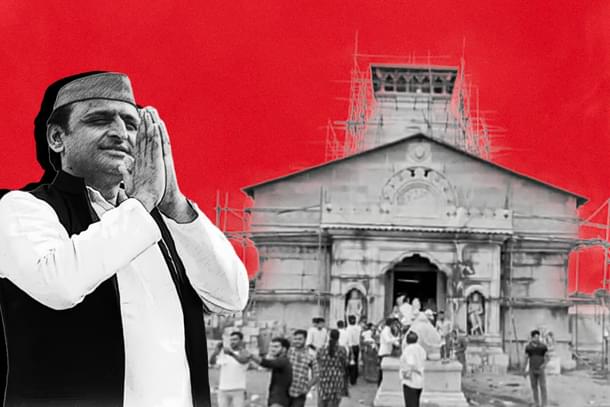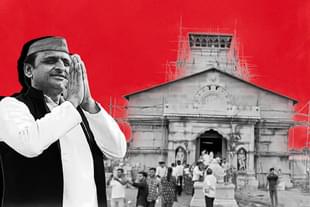Uttar Pradesh
Akhilesh Yadav Wants To Play The Soft Hindutva Card, But Will It Work For Him?
Nishtha Anushree
Jul 24, 2025, 11:49 AM | Updated 05:31 PM IST
Save & read from anywhere!
Bookmark stories for easy access on any device or the Swarajya app.


The success of the PDA (Pichhde, Dalit, Alpasankhyak, and Adivasi) formula in the 2024 Lok Sabha (LS) elections has given Akhilesh Yadav the confidence to expand his political outreach beyond traditional boundaries.
This shift is most evident in his recent foray into ‘soft Hindutva’, which has gained momentum in the Hindu holy month of Sawan, where on every Monday (considered an auspicious day to worship Lord Shiva), Yadav posts videos of a temple.
This temple is none other than the one being built by the Samajwadi Party (SP) national president himself near his native village, Saifai, located in the Luhanna village of the Etawah district in Uttar Pradesh (UP).
In late June, reports surfaced that Yadav might visit the Kashi Vishwanath Temple in Varanasi to perform jalabhishek on the first Monday of Sawan (14 July), in line with a century-old tradition of the Yadav community.
However, Yadav did not go. It has been a tradition for nearly a century that members of the Yadav community, also known as Yadav Bandhus, perform the first jalabhishek of Baba Vishwanath on the first Monday of Sawan.
If he had gone, it would be the first time that the former CM took part in this jalabhishek along with other members of the Yadav community. Instead, he posted a video of his own under-construction temple.
While the reasons for him skipping the Yadav community's jalabhishek at the Kashi Vishwanath temple are unknown, it may be a statement that instead of fitting into the Bharatiya Janata Party's (BJP) Hindutva narrative, Yadav wants to carve out a separate space for himself.
This is significant because the Kashi corridor was developed by Prime Minister Narendra Modi, and the renovated temple premises are widely seen as his legacy. Thus, Yadav chose to post videos of his own temple to extend greetings on the first Monday of Sawan.
Challenges to Yadav's ‘Soft Hindutva’
While Yadav has only recently begun venturing into ‘soft Hindutva’ politics, he is already encountering resistance from various sections of Hindu society.
Since the Etawah temple, named 'Kedareshwar Dham', is being constructed on the lines of Kedarnath Dham, one of Uttarakhand’s Char Dhams, it is facing opposition from saints and seers in Uttarakhand.
They allege that replicating the design undermines the sanctity of the Kedarnath temple, one of the 12 Jyotirlingas. Akhil Bharatiya Akhara Parishad president Mahant Ravindrapuri claimed that Yadav is orchestrating a “big conspiracy” against Sanatan Dharma to diminish the significance of the centuries-old Himalayan temple.
While Yadav has not responded to the criticism, a 2023 video of his roadside conversation with religious preacher Aniruddhacharya has recently gone viral, drawing further backlash over his perceived arrogance in engaging with a Hindu spiritual figure.
In addition to this, there are credibility concerns with Yadav’s ‘soft Hindutva’, given the ‘secular’ orientation of his party since its inception in 1992. In the Indian context, this has often translated to minority appeasement, particularly Muslim appeasement in UP.
Even before the SP was formally constituted, its founder Mulayam Singh Yadav, then a Janata Dal Chief Minister, ordered firing on karsevaks in Ayodhya in 1990. This further weakens the credibility of Akhilesh Yadav's current stance.
While it is commonly believed that public memory is short and decade-old controversies carry limited electoral weight, recent actions such as Yadav attending a meeting with SP MPs inside a mosque in Parliament Street have renewed doubts about the sincerity of his ‘soft Hindutva’ stance.
The biggest challenge to Yadav’s brand of Hindutva comes from UP Chief Minister Yogi Adityanath himself, who has firmly established himself as a powerful Hindutva icon, thereby limiting the space available for SP’s outreach.
The Need to Move Beyond PDA
It is worth asking why, given the PDA formula’s effectiveness in securing strong electoral results, Yadav is taking on such risks.
The SP won 37 of UP’s 80 LS seats, a significant leap from the five it secured in alliance with the Bahujan Samaj Party (BSP) in 2019. It even surpassed the BJP's tally of 33.
Additionally, the SP helped its ally Congress win six seats in UP, a feat not achieved in the past decade, as Congress had managed only two and one seats respectively in 2014 and 2019.
This turnaround is largely attributed to the shifting allegiance of OBC and SC voters from the BJP to SP, who believed in Yadav’s PDA vision, which aims to extend the party’s appeal beyond its traditional Muslim-Yadav (M-Y) vote base.
However, if the 2024 LS results are broken down into Assembly segments, SP led in over 220 of the total 403 seats in UP. This means that even with the PDA support, the SP still cannot secure a comfortable majority.
“For a comfortable majority, the SP needs the support of upper castes too. Without the upper castes’ support, performance in central UP and Awadh regions cannot be improved,” political commentator Amit Yadav told Swarajya.
This may explain why Akhilesh Yadav feels the need to go beyond PDA and engage in ‘soft Hindutva’ politics, aiming to give SP a real shot at forming a government in UP in 2027.
Recent incidents, such as the Etawah kathavachak controversy, have also alienated upper castes, especially Brahmins, from SP. Yadav might now be trying to correct this perception with his overtures to Hindu traditions.
The Manageable Risks
While a renewed Hindu outreach may help SP attract new voter segments, concerns remain over whether it might jeopardise its traditional M-Y vote bank.
However, the Yadavs are not likely to abandon SP. This was evident in the 2024 LS election, where the party gave no ticket to any Yadav outside the Saifai family.
Of the 62 UP seats contested by SP, only five were allotted to Yadav leaders, all from the Saifai family. Still, Yadavs are believed to have voted overwhelmingly for the SP, ignoring the issue of representation.
Professor Ramakant Roy of Etawah shared an anecdote with Swarajya about a Yadav colleague who travelled to Ambedkar Nagar to vote for an OBC SP candidate, despite a general belief that the candidate would not win.
“The SP candidate ultimately won despite all odds. But this says a lot about the Yadav loyalty to SP. They vote for any SP candidate, regardless of caste or winnability,” Professor Roy added.
Regarding the Muslim vote bank, the only potential attrition, if Muslims begin to question SP’s secular credentials due to Yadav’s ‘soft Hindutva’, would be towards Congress.
Since SP and Congress are in alliance, this seems unlikely. While the Congress keeps talking about organisational overhaul and contesting alone in 2027, Yadav continues to affirm the alliance’s continuity.
Muslim support for SP solidified after the decline of the BSP and has remained consistent despite reduced candidate representation.
Over the past three elections, the number of Muslim candidates fielded by SP has significantly declined, falling to just one-tenth in 2024 compared to 2014. However, their win rate and vote consolidation have increased.
In 2014, SP fielded 39 Muslim candidates, none of whom won. In 2019, the number dropped to nine, with three winning. By 2024, SP fielded only four Muslim candidates. All won.
Given the strong consolidation of Muslim votes, Amit Yadav believes that Akhilesh Yadav’s adoption of ‘soft Hindutva’ is unlikely to alienate his base.
“They (Muslims) know that all such gimmicks are for elections and wouldn’t mind it. The Muslim vote will remain consolidated even with Yadav’s ‘soft Hindutva’ appeals,” he told Swarajya.
The SP appears to have realised that its M-Y base will back it regardless of overt appeals or representation, thereby allowing it room to attract other castes.
The Space for ‘Soft Hindutva’
Even if Yadav maintains his core vote bank, the question remains: how will he find room for ‘soft Hindutva’ in a political landscape dominated by Yogi Adityanath?
While Yogi is known for his charisma and staunch Hindutva stance, he is also perceived as a hardliner, particularly for his uncompromising attitude towards Muslim offenders and rejection of appeasement politics.
This leaves space for a ‘soft Hindutva’ approach, which can appeal to Hindus who are proud of their identity but not inclined to express it through animosity towards Muslims, a perception often linked with Yogi’s politics.
Yadav can take cues from West Bengal, where Mamata Banerjee, despite facing anti-incumbency after 10 years, led her Trinamool Congress (TMC) to a landslide victory with 213 seats.
She combined ‘soft Hindutva’ with a Bengali versus outsider narrative and populist welfare schemes. Banerjee publicly recited the Chandi Path during rallies and television appearances, visited temples, invoked Hindu deities (particularly Durga and Kali), and presented her politics as aligned with inclusive Bengali Hindu culture.
She also announced honorariums for Hindu priests (purohits) and aid to Durga Puja committees, while dialling down minority appeasement optics in 2021 compared to 2016.
Her strategy helped consolidate the Muslim vote while also increasing her support among Hindus. Yadav may adopt a similar model, asserting his Hindu identity as the 2027 campaign nears, while contrasting it with BJP’s ‘divisive’ Hindutva.
Will ‘Soft Hindutva’ Work?
To make his ‘soft Hindutva’ stance credible, Yadav will need to rely on the public’s short memory, which often allows past controversies to fade.
He must also ensure that he and his party avoid making statements that appear anti-Hindu. Remarks such as associating foul smell with cow shelters or calling Hindu seers ‘mafia’ are poorly received.
SP leaders have also made controversial statements, including calling Mewar Rajpoot king Rana Sanga ‘a traitor’, dismissing the Ram Mandir as ‘useless’, and describing the Kanwar Yatra as ‘blind faith’, all of which are seen as affronts to Hindu culture and history.
If Yadav can curtail such rhetoric, he will enhance the credibility of his ‘soft Hindutva’ and increase the likelihood of gaining additional votes.
Even if he fails, he stands to lose little. His M-Y vote bank remains solid, and his PDA consolidation efforts continue unabated. These will not be adversely affected by his ‘soft Hindutva’ strategy.
Thus, Yadav is making a calculated gamble. If he fails, his core remains intact. But if he succeeds, however unlikely, it could bring the SP closer to securing a comfortable majority in 2027.
Meanwhile, the BJP, still searching for a counter to the PDA formula after its 2024 setbacks, may find itself facing a new challenge in combating Yadav’s ‘soft Hindutva’ with its ‘original Hindutva’.
Nishtha Anushree is Senior Sub-editor at Swarajya. She tweets at @nishthaanushree.




